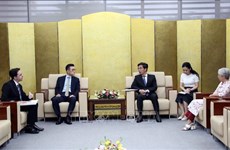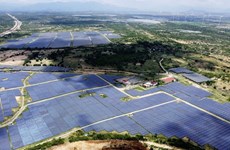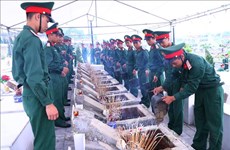Bac Giang continues administrative reform in service of people, enterprises
In 2023, the northern province of Bac Giang will push forward with administrative reform to better serve people and enterprises, according to its People’s Committee.
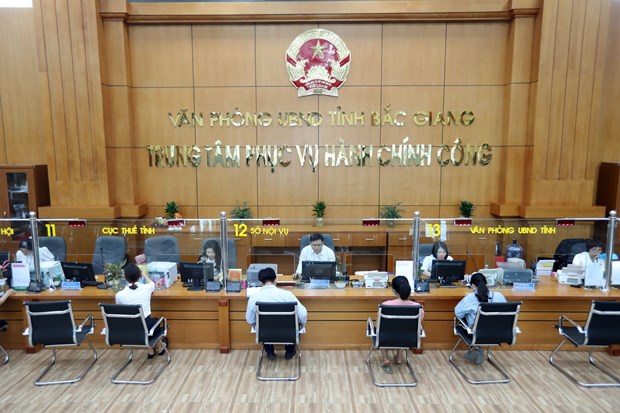 The division for receiving and handling procedures at the Bac Giang public administrative service centre (Photo: VNA)
The division for receiving and handling procedures at the Bac Giang public administrative service centre (Photo: VNA)The administration said Bac Giang's reforms must be carried out for the sake of people and enterprises, whose satisfaction is the meter of the effectiveness and quality at all state administrative agencies.
This year, administrative reform will centre on such activities as reforming regulations, administrative procedures, the apparatus and public finance, and developing electronic administration and digital administration.
In terms of institutional reform, the province will continue building and perfecting legal documents for all fields, with a focus on the rules of the apparatus, national target programmes, the decentralisation of power, and enterprise activities, the People’s Committee noted.
To reform administrative procedures, local authorities will conduct a review to propose the elimination or simplification of complicated and overlapping procedures to create favourable conditions for people and businesses.
Bac Giang hopes that in 2023, it will complete connecting data from the national database on social insurance and land with the National Public Service Portal and its information system for handling administrative procedures. The move is expected to facilitate the settlement of those procedures at single-window divisions at all levels.
The province looks to raise satisfaction of administrative procedures to at least 90%, including at least 85% for the handling of land, construction, and investment-related procedures. To that end, it will step up IT application to the work and digitalise settlement results to improve transparency and save time and costs.
This year, authorities in Bac Giang will press ahead with effectively reforming the administrative apparatus, public finance, and the methodology for monitoring and assessing administrative reform results. They will also maintain frequent surveys of people and enterprises’ opinions about administrative agencies’ performance, the People’s Committee said.
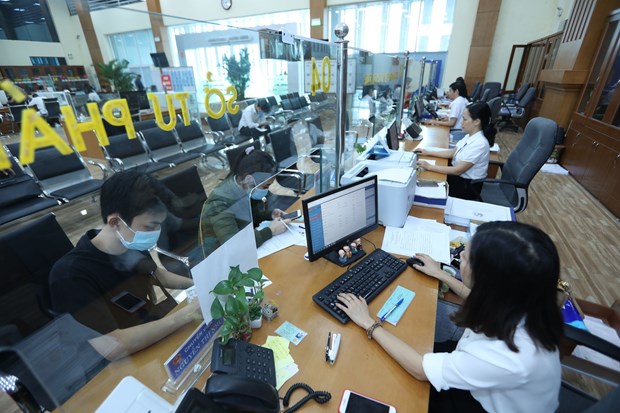 Civil servants work at the Bac Giang public administrative service centre. (Photo: VNA)
Civil servants work at the Bac Giang public administrative service centre. (Photo: VNA)The chairperson of the provincial People’s Committee also issued a code of conduct for the civil servants working at the single-window divisions so as to improve their sense of responsibility and attitude towards the provision of services for people and businesses.
Meanwhile, agencies and localities launched many initiatives hoped to prove fruitful in administrative reform. These include QR codes to give instructions on administrative procedures to people and businesses, building a digital database on natural resources and environment, and setting up a group for assisting the Republic of Korea’s investors. Also included is the expansion of the model of “exemplary single-window divisions at the communal level”, establishing groups of youth volunteers to help people and businesses submit dossiers online at communal single-window divisions, and settling administrative procedures outside working hours, the People’s Committee added.
Addressing the third session of the Government’s Steering Committee for Administrative Reform on February 3, Prime Minister Pham Minh Chinh stressed that administrative reform must centre on people and enterprises.
The PM, who is also head of the steering committee, said administrative reform was identified by the Party and State as one of the targeted strategic breakthroughs.
It is meant to create favourable conditions for people and enterprises; reduce the time needed for civil servants and public employees to perform duties; help fight corruption and negative phenomena; cut down input costs and improve the competitiveness of goods and services; and create an open, transparent, and clean administrative environment.
Administrative reform must be carried out strongly, constantly, and effectively in line with the Party’s guidelines and the State’s policies and laws, and put national interests above all, he said, asking ministries, sectors, and localities to step up administrative reform in tandem with innovation, digital transformation, and improvement of the business climate and the national competitiveness, he noted./.










